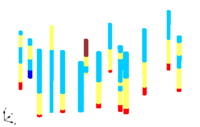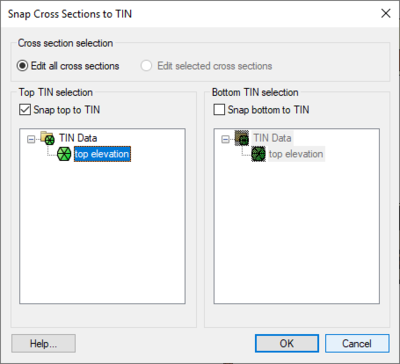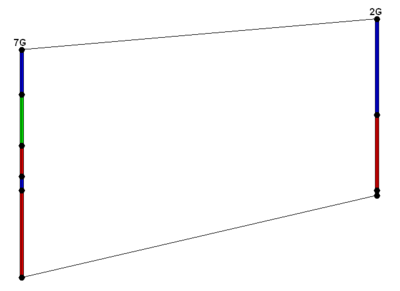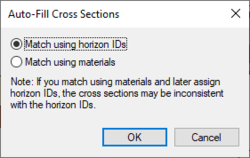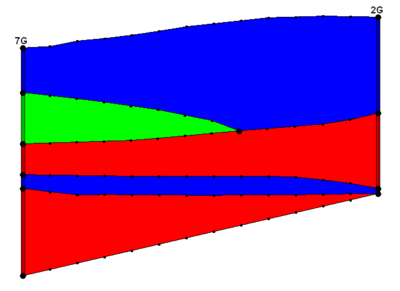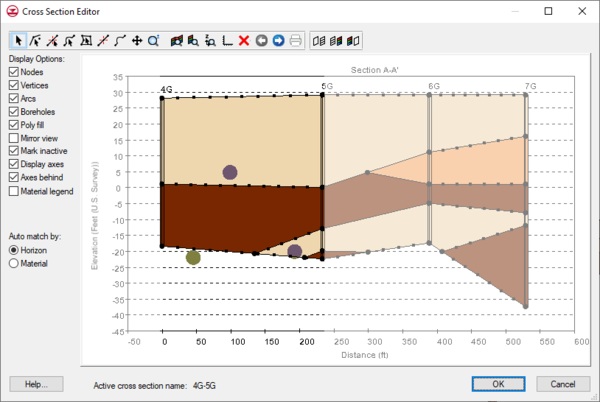GMS:Borehole Cross Sections: Difference between revisions
From XMS Wiki
Jump to navigationJump to search
| (38 intermediate revisions by 2 users not shown) | |||
| Line 2: | Line 2: | ||
A borehole cross section is a set of polylines and polygons that define the stratigraphy between two boreholes. A borehole cross section can be created manually or automatically. | A borehole cross section is a set of polylines and polygons that define the stratigraphy between two boreholes. A borehole cross section can be created manually or automatically. | ||
==Creation== | ==Creation== | ||
===Automatic | Cross sections can be created either automatically or manually. | ||
===Automatic Creation=== | |||
Cross sections can be created automatically using the ''Boreholes'' | '''Auto-Create Blank Cross Sections''' menu command. This uses a triangulation process to determine the most likely connections between boreholes. The top and/or bottom arcs of the new cross sections can be warped to match the elevation of [[GMS:TIN Module|TIN]] surfaces using the ''Snap Cross Sections to TIN'' dialog which appears when the ''Boreholes'' | '''Auto-Create Blank Cross Sections''' command is executed. Snapping the tops and bottoms of cross sections to TIN surfaces can also be done at any time via the ''Boreholes'' | ''Advanced'' | '''Snap Cross Sections to TIN''' menu command. Keep in mind, however, that warping the top and bottom of a cross section may interfere with the internal polygons that are defined in the cross section, so snapping to a TIN is best done before filling in the cross sections. | Cross sections can be created automatically using the ''Boreholes'' | '''Auto-Create Blank Cross Sections''' menu command. This uses a triangulation process to determine the most likely connections between boreholes. The top and/or bottom arcs of the new cross sections can be warped to match the elevation of [[GMS:TIN Module|TIN]] surfaces using the ''Snap Cross Sections to TIN'' dialog which appears when the ''Boreholes'' | '''Auto-Create Blank Cross Sections''' command is executed. Snapping the tops and bottoms of cross sections to TIN surfaces can also be done at any time via the ''Boreholes'' | ''Advanced'' | '''Snap Cross Sections to TIN''' menu command. Keep in mind, however, that warping the top and bottom of a cross section may interfere with the internal polygons that are defined in the cross section, so snapping to a TIN is best done before filling in the cross sections. | ||
:[[File:Snap Cross Sections to TIN.png|thumb|none|400 px|The ''Snap Cross Sections to TIN'' dialog]] | |||
===Manual | ===Manual Creation=== | ||
Cross sections can be created manually by using the [[GMS:Borehole Tool Palette|'''Create Cross Section''']] tool and clicking on boreholes. | Cross sections can be created manually by using the [[GMS:Borehole Tool Palette|'''Create Cross Section''']] tool and clicking on boreholes. | ||
==Editing== | ==Editing== | ||
When a borehole cross section is first created, it is made up of a set of default lines. The figure below shows a default cross section. Notice that "arcs" (polylines) have been created defining the top and bottom of the cross section and an | When a borehole cross section is first created, it is made up of a set of default lines. The figure below shows a default cross section. Notice that "arcs" (polylines) have been created defining the top and bottom of the cross section and an arc (polyline) has been created for each segment in the boreholes. | ||
[[Image:Xsect_Blank.png|none|thumb|400px|Default cross section]] | :[[Image:Xsect_Blank.png|none|thumb|400px|Default cross section]] | ||
===Automatic | ===Automatic Editing=== | ||
[[File:Auto-Fill Cross Sections.png|thumb|250 px|The ''Auto-Fill Cross Sections'' dialog]] | |||
The ''Boreholes ''| '''Auto-Fill Blank Cross Sections''' menu command can be used to automatically fill in all existing blank cross sections. The command can use either the [[GMS:Horizons|horizon]] IDs (preferred) or materials information on the boreholes. | The ''Boreholes ''| '''Auto-Fill Blank Cross Sections''' menu command can be used to automatically fill in all existing blank cross sections. The command can use either the [[GMS:Horizons|horizon]] IDs (preferred) or materials information on the boreholes. | ||
===Manual | ===Manual Editing=== | ||
To edit a cross section manually, use the [[GMS:Borehole Tool Palette|'''Select Cross Section''']] tool and select a cross section. The ''Cross Section Editor'' dialog can be then opened by selecting the '''Cross Section Editor''' command from the ''Borehole'' menu while either a single or a series of cross sections selected. It is also possible to launch the ''Cross Section Editor'' dialog by double-clicking on a single cross section. The next figure shows a finished cross section. | To edit a cross section manually, use the [[GMS:Borehole Tool Palette|'''Select Cross Section''']] tool and select a cross section. The ''Cross Section Editor'' dialog can be then opened by selecting the '''Cross Section Editor''' command from the ''Borehole'' menu while either a single or a series of cross sections selected. It is also possible to launch the ''Cross Section Editor'' dialog by double-clicking on a single cross section. The next figure shows a finished cross section. | ||
[[Image:Xsect_Sample.png|none|thumb| | :[[Image:Xsect_Sample.png|none|thumb|400px|Complete cross section]] | ||
===Restrictions=== | ===Restrictions=== | ||
| Line 27: | Line 30: | ||
==Borehole Cross Section Editor== | ==Borehole Cross Section Editor== | ||
The ''Cross Section Editor'' can be used to manually construct and view cross sections between boreholes. The ''Cross Section Editor'' in GMS 6.5 has been updated to allow for the display and editing of multiple borehole cross sections. The ''Cross Section Editor'' has a set of tools and | The ''Cross Section Editor'' can be used to manually construct and view cross sections between boreholes. The ''Cross Section Editor'' in GMS 6.5 has been updated to allow for the display and editing of multiple borehole cross sections. The ''Cross Section Editor'' has a set of tools and options used to create, edit, and view the cross sections. The tools used to create the nodes, polylines, and polygons are similar to the tools available in the [[GMS:Map Module|Map module]] used to create feature objects (points, arcs, and polygons). The following tables describe the tools and display options available in the ''Cross Section Editor''. | ||
:[[File:GMS Cross Section Editor.png|thumb|none|600 px|The ''Cross Section Editor'' dialog]] | |||
=== Tools === | === Tools === | ||
| Line 34: | Line 38: | ||
! Tool !! width = "125" | Tool Name !! Description | ! Tool !! width = "125" | Tool Name !! Description | ||
|- | |- | ||
| align = "center" | [[File:Select Object | | align = "center" | [[File:Select Object Tool.svg|8 px]] || '''Select Tool''' || Generic selection tool that selects nodes, vertices, arcs, and polygons | ||
|- | |- | ||
| align = "center" | [[ | | align = "center" | [[File:GMS Select Node Tool.svg|16 px]] || '''Select Point/Node''' || Selection tool that will only select points or nodes | ||
|- | |- | ||
| align = "center" | [[ | | align = "center" | [[File:GMS Select Vertex Tool.svg|16 px]] || '''Select Vertex''' || Selection tool that will only select vertices | ||
|- | |- | ||
| align = "center" | [[ | | align = "center" | [[File:GMS Select Arc Tool.svg|16 px]] || '''Select Arc''' || Selection tool that will only select arcs | ||
|- | |- | ||
| align = "center" | [[ | | align = "center" | [[File:GMS Select Polygon Tool.svg|16 px]] || '''Select Polygon''' || Selection tool that will only select polygons | ||
|- | |- | ||
| align = "center" | [[ | | align = "center" | [[File:GMS Create Vertex.svg|16 px]] || '''Create Vertex''' || Creates new vertices along arcs within the cross section | ||
|- | |- | ||
| align = "center" | [[ | | align = "center" | [[File:GMS Create Arc Tool.svg|16 px]] || '''Create Arc''' || Creates arcs between two nodes or vertices within the cross section | ||
|- | |- | ||
| align = "center" | [[File:Pan | | align = "center" | [[File:Pan Tool.svg|16 px]] || '''Pan''' || Pans in the viewing area of the Graphics Window | ||
|- | |- | ||
| align = "center" | [[File:Zoom | | align = "center" | [[File:Zoom Tool Icon.svg|16 px]] || '''Zoom''' || Magnifies or shrinks the current viewing area | ||
|- | |- | ||
| align = "center" | [[ | | align = "center" | [[File:Borehole Frame All Cross Sections Tool.svg|16 px]] || '''Frame All Cross Sections''' || Frames to the extents of all the cross sections | ||
|- | |- | ||
| align = "center" | [[ | | align = "center" | [[File:Borehole Frame Current Cross Section Tool.svg|16 px]] || '''Frame Current Cross Section''' || Frames to the extents of the current cross section | ||
|- | |- | ||
| align = "center" | [[ | | align = "center" | [[File:Borehole Z-Magnification Tool.svg|16 px]] || '''Z-Magnification''' || Adjusts the Z-Magnification factor to increase or decrease the graphical display along the Y (real world Z) axis, making more or less room at the top and bottom of the screen while maintaining the boreholes and cross sections in the middle of the screen | ||
|- | |- | ||
| align = "center" | [[ | | align = "center" | [[File:Borehole Plot Options Tool.svg|16 px]] || '''Plot Options''' || Opens the [[GMS:Plot Options Dialog|''Plot Options'']] dialog. The dialog has tools for adjusting the axes plot options, including: title, background color, font, font color, grid display, axes titles, and axes display | ||
|- | |- | ||
| align = "center" | [[ | | align = "center" | [[File:GMS Delete Icon.svg|14 px]] || '''Delete''' || Deletes the currently selected vertices, nodes, arcs, or polygons | ||
|- | |- | ||
| align = "center" | [[ | | align = "center" | [[File:Borehole Left Tool.svg|16 px]] || '''Left''' || Activates the cross section to the left of the current cross section as the current cross section | ||
|- | |- | ||
| align = "center" | [[ | | align = "center" | [[File:Borehole Right Tool.svg|16 px]] || '''Right''' || Activates the cross section to the right of the current cross section as the current cross section | ||
|- | |- | ||
| align = "center" | [[File:Print | | align = "center" | [[File:Print Icon.svg|16 px]] || '''Print''' || Prints the current Graphics Window | ||
|- | |- | ||
| align = "center" | [[ | | align = "center" | [[File:Borehole Auto Match Cross Section Tool.svg|16 px]] || '''Auto-Match Cross Section''' || Creates a set of straight arcs connecting matching contacts on adjacent boreholes based on the selection to use Horizons or Materials | ||
|- | |- | ||
| align = "center" | [[ | | align = "center" | [[File:Borehole Build Cross Section Polygons Tool.svg|16 px]] || '''Build Cross Section Polygons''' || Deletes all current polygons, builds new polygons using all of the arcs, and checks to see if every polygon built is valid. A polygon is valid only if it contains either one arc representing a borehole region or two arcs representing two matching borehole regions on two holes. Thus, every valid polygon can be assigned one and only one material type. If every polygon built is valid, the Color Fill toggle will be automatically turned on and all polygons built will be filled with the color representing the material they are assigned. Otherwise, a dialog saying "Invalid polygons present" will pop up and all polygons built will be deleted. | ||
|- | |- | ||
| align = "center" | [[ | | align = "center" | [[File:Borehole Delete All Cross Sections Tool.svg|16 px]] || '''Delete All''' || Deletes all of the vertices, nodes, arcs, and polygons in the current cross section | ||
|} | |} | ||
====Tool Options==== | |||
Some tools in the ''Cross Section Editor'' contain right-click options. These include: | |||
* '''Select Point/Node''' [[File:GMS Select Node Tool.svg|16 px]] has the following right-click commands: | |||
** '''Node to Vertices''' – Converts the selected node to a vertex. | |||
* '''Select Vertex''' [[File:GMS Select Vertex Tool.svg|16 px]] has the following right-click commands: | |||
** '''Vertices to Nodes''' – Converts the selected vertex to a node. | |||
* '''Select Arc''' [[File:GMS Select Arc Tool.svg|16 px]] has the following right-click commands: | |||
** '''Redistribute Vertices''' – Opens the ''Redistribute Vertices'' dialog where the distribution of the vertices on the arc can be adjusted. | |||
** '''Tin to Arc''' – Allows selecting a TIN in the project in order to interpolate the TIN elevations to the arc. | |||
** '''Raster to Arc''' – Allows selecting a raster in the project in order to interpolate the raster elevations to the arc. | |||
=== Display Options === | === Display Options === | ||
| Line 80: | Line 95: | ||
! Display Toggle !! Description | ! Display Toggle !! Description | ||
|- | |- | ||
| align = "center" | | | align = "center" | ''Nodes'' || Controls the display of the nodes in the graphics window | ||
|- | |- | ||
| align = "center" | | | align = "center" | ''Vertices'' || Controls the display of the vertices in the graphics window | ||
|- | |- | ||
| align = "center" | | | align = "center" | ''Arcs''|| Controls the display of the arcs in the graphics window | ||
|- | |- | ||
| align = "center" | | | align = "center" | ''Boreholes'' || Controls the display of the arcs in the graphics window | ||
|- | |- | ||
| align = "center" | | | align = "center" | ''Poly fill'' || Controls the display of the polygons in the graphics window | ||
|- | |- | ||
| align = "center" | | | align = "center" | ''Mirror view'' || Reverses the order in which the cross sections are displayed | ||
|- | |- | ||
| align = "center" | | | align = "center" | ''Mark inactive'' || Dims the inactive cross sections | ||
|- | |- | ||
| align = "center" | | | align = "center" | ''Display axes'' || Controls the display of the plot axes in the graphics window | ||
|- | |- | ||
| align = "center" | | | align = "center" | ''Axes behind'' || When checked, the axes are drawn behind the cross section. When unchecked, the axes are drawn on top of the cross section. | ||
|- | |- | ||
| align = "center" | | | align = "center" | ''Material legend'' || Controls the display of the material legend | ||
|} | |} | ||
{{Navbox GMS}} | {{Navbox GMS}} | ||
[[Category:Boreholes]] | [[Category:Boreholes|Cross]] | ||
[[Category:Stratigraphy]] | [[Category:Stratigraphy|Cross]] | ||
[[Category:Borehole Dialogs]] | [[Category:Borehole Dialogs|Cross]] | ||
[[Category:Cross Sections]] | |||
